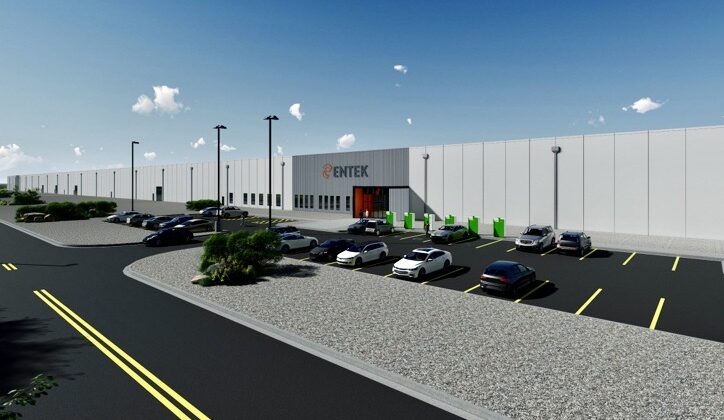
ENTEK, the US-owned and US-based producer of “wet-process’”lithium-ion battery-separator materials, has received a direct loan of up to $1.2 billion to ENTEK Lithium Separators LLC (ENTEK) from the US Dept. of Energy’s (DOE) Loan Programs Office (LPO).
The loan will substantially finance the new facility in Terre Haute, IN, to manufacture lithium-ion battery separators to be used primarily in electric vehicles (EVs). This project will strengthen and onshore the lithium-ion battery-cell supply chain, enabling the creation of batteries used in advanced technology vehicles.
“For 40 years, ENTEK has been serving the battery-separator component needs of its customers with a commitment to productivity and innovation that our customers require for their battery applications,” says ENTEK CEO Larry Keith. “The separator is a critical battery component responsible for the safety of the lithium batteries that we are increasingly relying on in many aspects of both our daily lives and as a country as we move to compete globally in energy storage critical to our national security.”
A battery separator is a microporous membrane sandwiched between the anode and cathode of a battery. The principal functions of the battery separator are to prevent electronic conduction (i.e., shorts or direct contact) between the anode and cathode while permitting ionic conduction via the electrolyte. Separators play an essential role in the performance and safety of lithium-ion batteries. ENTEK manufactures both ceramic-coated and uncoated separators.
ENTEK will be able to customize battery separators to accommodate numerous EV-battery designs. The separators produced will be able to accommodate all existing lithium-ion EV-battery chemistries, including NMC, NCA, LMFP, and LFP. Additionally, ENTEK will be able to sell its separators to manufacturers of lithium-ion batteries for energy-storage applications.
ENTEK aims to become the US’s first end-to-end, domestic supplier of “wet process” battery separators for the North American lithium-ion EV battery market. The project will make a significant contribution to domestic separator capacity and help US EV battery manufacturers satisfy the Inflation Reduction Act’s domestic content rules under the 30D Clean Vehicle Credit.

